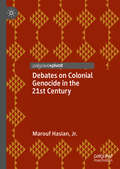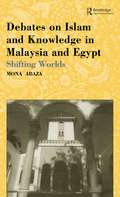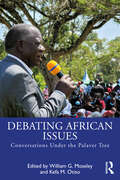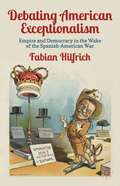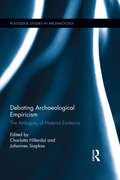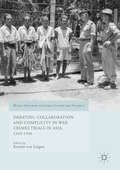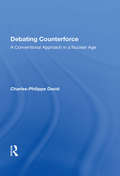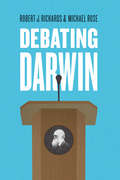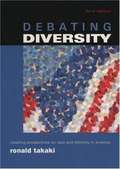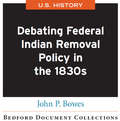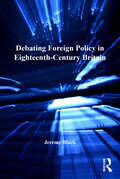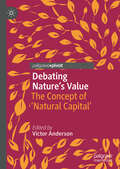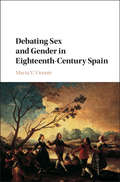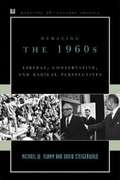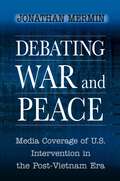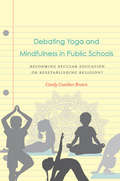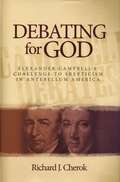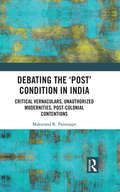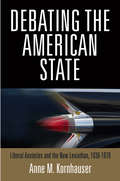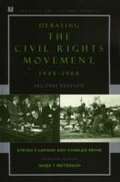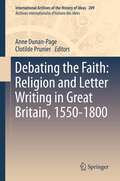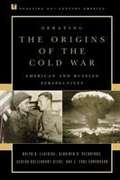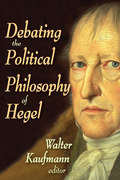- Table View
- List View
Debates on Colonial Genocide in the 21st Century
by Marouf Hasian Jr.This book analyses the debates on colonial genocide in the 21st century and introduces cases where states are reluctant to acknowledge genocides. The author departs from traditional studies of the work of Raphael Lemkin or U.N. definitions of genocide so that readers can examine genocide recognition as a political act that is bound up in partial perceptions and political motivations. The study looks at the Tasmanian genocide, Al-Nakba, and several other tragic events. It also looks at the ways that these historical and contemporary debates about colonial genocides are related to today’s conversations about apologies and other restorative justice acts. This work will be of interest to a wide range of audiences including researchers, scholars, graduate students, and policy makers in the fields of political history, genocide studies, and political science.
Debates on Islam and Knowledge in Malaysia and Egypt: Shifting Worlds
by Mona AbazaThis book is a comparative study of the sociological field in two different Muslim societies: Malaysia and Egypt. It analyses the process of the production of 'knowledge' through the example of the modern 'Islamization of knowledge debate' and local empirical variations.
Debating African Issues: Conversations Under the Palaver Tree
by William G. Moseley Kefa M. OtisoThis debate style textbook allows students to explore diverse, well-founded views on controversial African issues, pushing them to go beyond superficial interpretations and complicate and ground their understanding of the continent. From the positive images in the film Black Panther, to the derogatory remarks of former American President Donald Trump, the African continent often figures prominently in the collective, global imagination. This interdisciplinary collection covers 20 enduring and contemporary debates across a broad range of subjects affecting Africa, from development and health to agriculture, climate change, and urbanization. Each chapter has a pro and con view penned by a leading expert on the topic in an accessible and engaging style. These contrasting views on each issue are framed by an introduction that helps the student contextualize the debate and draw on further resources. Moreover, they enable readers to deepen their understanding of the topic, develop a more nuanced perspective, and foster classroom debates. This book is an excellent resource for Africa related courses across a range of disciplinary and interdisciplinary fields including African studies, anthropology, development studies, economics, environmental studies, geography, history, international studies, political science and public health.
Debating American Exceptionalism
by Fabian HilfrichThe Spanish-American War focused not only on foreign policy, but also on the nation's very essence and purpose. At the heart of this debate was a consensus on American nationalism. This book explains why the belief in exceptionalism still serves as the basis of American nationalism and foreign policy even in spite of more recent military failures.
Debating Archaeological Empiricism: The Ambiguity of Material Evidence (Routledge Studies in Archaeology)
by Charlotta Hillerdal Johannes SiapkasDebating Archaeological Empiricism examines the current intellectual turn in archaeology, primarily in its prehistoric and classical branches, characterized by a return to the archaeological evidence. Each chapter in the book approaches the empirical from a different angle, illuminating contemporary views and uses of the archaeological material in interpretations and theory building. The inclusion of differing perspectives in this collection mirrors the conceptual landscape that characterizes the discipline, contributing to the theoretical debate in archaeology and classical studies. As well as giving an important snapshot of the practical as well as theoretical uses of materiality in archaeologies today, this volume looks to the future of archaeology as an empirical discipline.
Debating Collaboration and Complicity in War Crimes Trials in Asia, 1945-1956
by Kerstin Von LingenThis innovative volume examines the nexus between war crimes trials and the pursuit of collaborators in post-war Asia. Global standards of behaviour in time of war underpinned the prosecution of Japanese military personnel in Allied courts in Asia and the Pacific. Japan's contradictory roles in the Second World War as brutal oppressor of conquered regions in Asia and as liberator of Asia from both Western colonialism and stultifying tradition set the stage for a tangled legal and political debate: just where did colonized and oppressed peoples owe their loyalties in time of war? And where did the balance of responsibility lie between individuals and nations? But global standards jostled uneasily with the pluralism of the Western colonial order in Asia, where legal rights depended on race and nationality. In the end, these limits led to profound dissatisfaction with the trials process, despite its vast scale and ambitious intentions, which has implications until today.
Debating Counterforce: A Conventional Approach In A Nuclear Age
by Charles-Philippe DavidSince the U.S. presidential elections of 1980, debate has intensified between those who believe that nuclear weapons can only deter a war not intended to be fought and those who see nuclear weapons as an advancement in weaponry that allows for the waging and winning of a nuclear war. At the focal point of this debate is the rise of the “counterforc
Debating Darwin: From Darwin To Dna
by Robert J. Richards Michael RuseCharles Darwin is easily the most famous scientist of the modern age, and his theory of evolution is constantly referenced in many contexts by scientists and nonscientists alike. And yet, despite how frequently his ideas are evoked, there remains a surprising amount we don't know about the father of modern evolutionary thinking, his intellectual roots, and the science he produced. Debating Darwin seeks to change that, bringing together two leading Darwin scholars--Robert J. Richards and Michael Ruse--to engage in a spirited and insightful dialogue, offering their interpretations of Darwin and their critiques of each other's thinking. Examining key disagreements about Darwin that continue to confound even committed Darwinists, Richards and Ruse offer divergent views on the origins and nature of Darwin and his ideas. Ruse argues that Darwin was quintessentially British and that the roots of his thought can be traced back to the eighteenth century, particularly to the Industrial Revolution and thinkers such as Adam Smith and Thomas Robert Malthus. Ruse argues that when these influences are appreciated, we can see how Darwin's work in biology is an extension of their theories. In contrast, Richards presents Darwin as a more cosmopolitan, self-educated man, influenced as much by French and particularly German thinkers. Above all, argues Richards, it was Alexander von Humboldt who both inspired Darwin and gave him the conceptual tools that he needed to find and formulate his evolutionary hypotheses. Together, the authors show how the reverberations of the contrasting views on Darwin's influences can be felt in theories about the nature of natural selection, the role of metaphor in science, and the place of God in Darwin's thought. Revealing how much there still is to investigate and interrogate about Darwin's ideas, Debating Darwin contributes to our understanding of evolution itself. The book concludes with a jointly authored chapter that brings this debate into the present, focusing on human evolution, consciousness, religion, and morality. This will be powerful, essential reading for anyone seeking a comprehensive understanding of modern-day evolutionary science and philosophy.
Debating Dissent
by Gregory S. Kealey Lara A. Campbell Dominique ClementAlthough the 1960s are overwhelmingly associated with student radicalism and the New Left, most Canadians witnessed the decade's political, economic, and cultural turmoil from a different perspective. Debating Dissent dispels the myths and stereotypes associated with the 1960s by examining what this era's transformations meant to diverse groups of Canadians - and not only protestors, youth, or the white middle-class.With critical contributions from new and senior scholars, Debating Dissent integrates traditional conceptions of the 1960s as a 'time apart' within the broader framework of the 'long-sixties' and post-1945 Canada, and places Canada within a local, national, an international context. Cutting-edge essays in social, intellectual, and political history reflect a range of historical interpretation and explore such diverse topics as narcotics, the environment, education, workers, Aboriginal and Black activism, nationalism, Quebec, women, and bilingualism. Touching on the decade's biggest issues, from changing cultural norms to the role of the state, Debating Dissent critically examines ideas of generational change and the sixties.
Debating Diversity: Clashing Perspectives on Race and Ethnicity in America (3rd edition)
by Ronald T. TakakiIn the nineteenth century Herman Melville wrote, "America was settled by peoples of all nations....You cannot spill a drop of American blood without spilling the blood of the whole world. We are not a narrow tribe." At the beginning of the twenty-first century, America is more ethnically diverse than ever before. Will we fear this expanding diversity as the disuniting of America, or will we embrace a more inclusive re-definition of our national identity? As the nation's preeminent scholar of multicultural studies, Ronald Takaki invites us to address this question by "debating diversity." The overarching theme of his new anthology is the clash of perspectives over the master narrative of American history--the powerful but mistaken story that this country was settled by European immigrants and that Americans are white. The collection opens with the lively intellectual exchange between Nathan Glazer and Ronald Takaki on ethnicity versus race; it then turns to the contrasting interpretations of the frontier by Frederick Jackson Turner and Takaki. Other debates include: Samuel P. Huntington and Elizabeth Martinezon the diversity of civilizations; Irving Kristol and William Julius Wilson on inner-city blacks; Robert J. Samuelson and Gregory Defreitas on Mexican immigration; Governor Pete Wilson and Chancellor Chang-lin Tien on affirmative action; and James Q. Wilson and Elliott Currie on crime and punishment. The anthology closes with a debate between Arthur Schlesinger, Jr., and Takaki on whether we as Americans should pursue a vision of our society as a melting pot or as a multicultural democracy. Embedded in all of the essays is the question: "Originating from different shores, can we become one people of the United States of America?" An ideal text for diversity courses in Ethnic Studies, Political Science, American Studies, History, Sociology, Anthropology, and Education, Debating Diversity will stir students to think critically about who we have been and who we are as Americans.
Debating Federal Indian Removal Policy in the 1830s (Bedford Document Collections)
by John P. Bowes<P>This unit intends to complicate common understandings of Indian removal that focus almost exclusively on the Cherokee history and experience. Instead, this unit provides a diverse range of source materials that allow you to look beyond Cherokee removal in the Southeast and the Trail of Tears to gain insight into the ideas at the heart of the debate over the federal policy. <P>Through careful analysis of the documents, you will learn about the principles grounding the arguments made by Americans for and against the removal policy, even as you gain a glimpse into the different strategies used by Indian leaders to resist or influence the implementation of that same policy. On completion of this unit, you should be able to answer the central question: What concepts were at the heart of the national debate regarding Indian removal policy?
Debating Foreign Policy in Eighteenth-Century Britain
by Jeremy BlackIt was during the course of the eighteenth century that Britain's status as a major maritime and commercial power was forged, shaping the political, economic and military policies of the nation for the next two centuries. Starting from a relatively minor role in global affairs before 1700, Britain rapidly rose to become a significant player in European affairs, and leading imperial power by 1800. In this commanding contribution to the subject, Jeremy Black draws on his extensive expertise to examine how British political culture and public debate in this period responded to, and in part shaped, this transition to an increasingly prominent role in world affairs. Rather than offering a familiar narrative of Britain's eighteenth-century foreign policy, this book instead focuses upon how this policy was debated and written about in British society. Taking as a central theme the debate over policy and the development of public culture and politics, the study explores how these were linked to developing relations with Europe and helped shape colonial strategies and expectations. It highlights how widely shared concerns about such issues as national defence, the strength of the Royal Navy and trade protection, presented little consensus in how they were to be realised and were the subject of fierce public debate. The book underlines how these kinds of issues were not considered in the abstract, but in terms of a political community that was divided over a series of key issues. By probing the problems and issues surrounding the need to define and discuss Britain's foreign policy in semi-public and public contexts, this book offers a fascinating insight into questions of perceived national interest, and how this developed and evolved over the course of the eighteenth century. This work complements the author's other studies by joining the institutional focus seen there to a wider assessment of public politics and print culture, and as such will make a central contribution to studies of eighteenth-century Britain and Europe.
Debating Nature’s Value: The Concept Of 'natural Capital'
by Victor AndersonThe concept of 'Natural Capital' has come to play a central role in current debates about biodiversity and nature conservation. It implies an approach to the natural world based on the valuation of places and species in terms of money. This is, in a variety of ways, both attractive and problematic. This edited collection comprehensively discusses the issues raised by the concept of 'Natural Capital', with contributors presenting not only arguments for and against the widespread adoption of the idea, but also viewpoints arguing for nuanced, pragmatic and middle-ground positions.
Debating Sex and Gender in Eighteenth-Century Spain
by Vicente Marta V.Eighteenth-century debates continue to set the terms of modern day discussions on how 'nature and nurture' shape sex and gender. Current dialogues - from the tension between 'real' and 'ideal' bodies, to how nature and society shape sexual difference - date back to the early modern period. Debating Sex and Gender is an innovative study of the creation of a two-sex model of human sexuality based on different genitalia within Spain, reflecting the enlightened quest to promote social reproduction and stability. Drawing on primary sources such as medical treatises and legal literature, Vicente traces the lives of individuals whose ambiguous sex and gender made them examples for physicians, legislators and educators for how nature, family upbringing, education, and the social environment shaped an individual's sex. This book brings together insights from the histories of sexuality, medicine and the law to shed new light on this timely and important field of study.
Debating The 1960s: Liberal, Conservative, And Radical Perspectives
by Michael W. Flamm David SteigerwaldThe conventional interpretation of the 1960s emphasizes how liberal, even radical, the decade was. It was, after all, the age of mass protests against the Vietnam War and social movements on behalf of civil rights and women's rights. It was also an era when the counterculture challenged many of the values and beliefs held by morally traditional Americans. But a newer interpretation stresses how truly polarized the 1960s were. It portrays how radicals, liberals, and conservatives repeatedly clashed in ideological combat for the hearts and minds of Americans. Millions in the center and on the right contested the counterculture, defended the Vietnam War, and opposed civil rights. <p><p> Debating the 1960s explores the decade through the arguments and controversies between radicals, liberals, and conservatives. The focus is on four main areas of contention: social welfare, civil rights, foreign relations, and social order. The book also examines the emergence of the New Left and the modern conservative movement. Finally, it assesses the enduring importance of the 1960s on contemporary American politics and society. Combining analytical essays and historical documents, the book highlights the polarization of the decade by focusing on the political, social, and cultural debates that divided the nation then and now.
Debating War and Peace: Media Coverage of U.S. Intervention in the Post-Vietnam Era
by Jonathan MerminThe First Amendment ideal of an independent press allows American journalists to present critical perspectives on government policies and actions; but are the media independent of government in practice? Here Jonathan Mermin demonstrates that when it comes to military intervention, journalists over the past two decades have let the government itself set the terms and boundaries of foreign policy debate in the news. Analyzing newspaper and television reporting of U.S. intervention in Grenada and Panama, the bombing of Libya, the Gulf War, and U.S. actions in Somalia and Haiti, he shows that if there is no debate over U.S. policy in Washington, there is no debate in the news. Journalists often criticize the execution of U.S. policy, but fail to offer critical analysis of the policy itself if actors inside the government have not challenged it. Mermin ultimately offers concrete evidence of outside-Washington perspectives that could have been reported in specific cases, and explains how the press could increase its independence of Washington in reporting foreign policy news. The author constructs a new framework for thinking about press-government relations, based on the observation that bipartisan support for U.S. intervention is often best interpreted as a political phenomenon, not as evidence of the wisdom of U.S. policy. Journalists should remember that domestic political factors often influence foreign policy debate. The media, Mermin argues, should not see a Washington consensus as justification for downplaying critical perspectives.
Debating Yoga and Mindfulness in Public Schools: Reforming Secular Education or Reestablishing Religion?
by Candy Gunther BrownYoga and mindfulness activities, with roots in Asian traditions such as Hinduism or Buddhism, have been brought into growing numbers of public schools since the 1970s. While they are commonly assumed to be secular educational tools, Candy Gunther Brown asks whether religion is truly left out of the equation in the context of public-school curricula. An expert witness in four legal challenges, Brown scrutinized unpublished trial records, informant interviews, and legal precedents, as well as insider documents, some revealing promoters of "Vedic victory" or "stealth Buddhism" for public-school children. The legal challenges are fruitful cases for Brown's analysis of the concepts of religious and secular.While notions of what makes something religious or secular are crucial to those who study religion, they have special significance in the realm of public and legal norms. They affect how people experience their lives, raise their children, and navigate educational systems. The question of religion in public education, Brown shows, is no longer a matter of jurisprudence focused largely on the establishment of a Protestant Bible or nonsectarian prayer. Instead, it now reflects an increasingly diverse American religious landscape. Reconceptualizing secularization as transparency and religious voluntarism, Brown argues for an opt-in model for public-school programs.
Debating for God: Alexander Campbell's Challenge to Skepticism in Antebellum America
by Richard J. CherokDebating for God demonstrates that Alexander Campbell was the foremost apologist of his era and, perhaps, the premier apologist that America has produced. Christians interested in "evidences" and Church historians will find this book fascinating.
Debating the 'Post' Condition in India: Critical Vernaculars, Unauthorized Modernities, Post-Colonial Contentions
by Makarand R. ParanjapeHow was the post-modernist project contested, subverted and assimilated in India? This book offers a personal account and an intellectual history of its reception and response. Tracing independent India’s engagement with Western critical theory, Paranjape outlines both its past and ‘post’. The book explores the discursive trajectories of post-modernism, post-colonialism, post-Marxism, post-nationalism, post-feminism, post-secularism — the relations that mediate them — as well as interprets, in the light of these discussions, core tenets of Indian philosophical thought. Paranjape argues that India’s response to the modernist project is neither submission, willing or reluctant, nor repudiation, intentional or forced; rather India’s ‘modernity’ is ‘unauthorized’, different, subversive, alter-native and alter-modern. The book makes the case for a new integrative hermeneutics, the idea of the indigenous ‘critical vernacular’, and presents a radical shift in the understanding of svaraj (beyond decolonisation and nationalism) to express transformations at both personal and political levels. A key intervention in Indian critical theory, this volume will interest researchers and scholars of literature, philosophy, political theory, culture studies and postcolonial studies.
Debating the American State
by Anne M. KornhauserThe New Deal left a host of political, institutional, and economic legacies. Among them was the restructuring of the government into an administrative state with a powerful executive leader and a large class of unelected officials. This "leviathan" state was championed by the political left, and its continued growth and dominance in American politics is seen as a product of liberal thought--to the extent that "Big Government" is now nearly synonymous with liberalism. Yet there were tensions among liberal statists even as the leviathan first arose. Born in crisis and raised by technocrats, the bureaucratic state always rested on shaky foundations, and the liberals who built and supported it disagreed about whether and how to temper the excesses of the state while retaining its basic structure and function.Debating the American State traces the encounter between liberal thought and the rise of the administrative state and the resulting legitimacy issues that arose for democracy, the rule of law, and individual autonomy. Anne Kornhauser examines a broad and unusual cast of characters, including American social scientists and legal academics, the philosopher John Rawls, and German refugee intellectuals who had witnessed the destruction of democracy in the face of a totalitarian administrative state. In particular, she uncovers the sympathetic but concerned voices--commonly drowned out in the increasingly partisan political discourse--of critics who struggled to reconcile the positive aspects of the administrative state with the negative pressure such a contrivance brought on other liberal values such as individual autonomy, popular sovereignty, and social justice. By showing that the leviathan state was never given a principled and scrupulous justification by its proponents, Debating the American State reveals why the liberal state today remains haunted by programmatic dysfunctions and relentless political attacks.
Debating the Civil Rights Movement, 1945-1968 (2nd edition)
by James T. PattersonJust as in other volumes in the Debating Twentieth-Century America series, this volume contains two essays demonstrating contrasting historical perspectives on the same phenomenon, in this case the Civil Rights movement. Lawson (History, Rutgers, State U. of New Jersey) represents the "great men" approach, looking at the role of national leaders in advancing civil rights, while Payne (African American studies and History, Duke U.) concentrates more on the "view from the trenches." Each essay is accompanied by a selection of primary documents in support of the views presented.
Debating the End of History: The Marketplace, Utopia, and the Fragmentation of Intellectual Life (Critical American Studies)
by David W. NobleWhy do modern people assume that there will be perpetual economic growth? Because, David W. Noble tells us in this provocative study of cultural criticism, such a utopian conviction is the necessary foundation for bourgeois culture. One can imagine the existence of modern middle classes only as long as the capitalist marketplace is expanding. For Noble, the related—and relevant—question is, how can the middle classes believe that a finite earth is an environment in which infinite growth is possible? The answer, which Noble so painstakingly charts, is nothing less than a genealogy of the uses and abuses of knowledge that lie at the heart of so many of our political problems today.As far back as Plato and as recently as Alan Greenspan, Noble finds proponents of the idea of a world of independent, rational individuals living in timeless simplicity, escaping from an old world of interdependence and generations. Such notions, although in sync with Newtonian science, have come up against the subsequent conclusions of geology, biology, and the physics of Einstein. In a survey of the responses to this quandary of historians, economists, literary critics, and ecologists, Noble reveals how this confrontation, and its implications for a single global marketplace, has forced certain academic disciplines into unnatural—and untenable—positions.David Noble&’s work exposes the cost—not academic at all—of the segregation of the physical sciences from the humanities and social sciences, even as it demonstrates the required movement of the humanities toward the ecological vision of a single, interconnected world.
Debating the Faith: Religion and Letter Writing in Great Britain, 1550-1800
by Anne Dunan-Page Clotilde PrunierThe first book to address the role of correspondence in the study of religion, Debating the Faith: Religion and Letter Writing in Great Britain, 1550-1800 shows how letters shaped religious debate in early-modern and Enlightenment Britain, and discusses the materiality of the letters as well as questions of form and genre. Particular attention is paid to the contexts in which letters were composed, sent, read, distributed, and then destroyed, copied or printed, in periods of religious tolerance or persecution. The opening section, 'Protestant identities', examines the importance of letters in the shaping of British protestantism from the underground correspondence of Protestant martyrs in the reign of Mary I to dissident letters after the Act of Toleration. 'Representations of British Catholicism', explores the way English, Irish and Scottish Catholics, whether in exile or at home, defined their faith, established epistolary networks, and addressed political and religious allegiances in the face of adversity. The last part, 'Religion, science and philosophy', focuses on the religious content of correspondence between natural scientists and philosophers.
Debating the Origins of the Cold War: American and Russian Perspectives (Debating Twentieth-Century America)
by Vladimir Pechatnov Ralph Levering Verena Botzenhart-Viehe C. EdmondsonDebating the Origins of the Cold War examines the coming of the Cold War through Americans' and Russians' contrasting perspectives and actions. In two engaging essays, the authors demonstrate that a huge gap existed between the democratic, capitalist, and global vision of the post-World War II peace that most Americans believed in and the dictatorial, xenophobic, and regional approach that characterized Soviet policies. The authors argue that repeated failures to find mutually acceptable solutions to concrete problems led to the rapid development of the Cold War, and they conclude that, given the respective concerns and perspectives of the time, both superpowers were largely justified in their courses of action. Supplemented by primary sources, including documents detailing Soviet espionage in the United States during the 1930s and 1940s and correspondence between Premier Josef Stalin and Foreign Minister V. M. Molotov during postwar meetings, this is the first book to give equal attention to the U.S. and Soviet policies and perspectives.
Debating the Political Philosophy of Hegel
by Walter KaufmannFew philosophers have had as much influence as Hegel. When he died in 1831, he not only dominated German philosophy, but also left his mark on the study of religion and art, on historical studies, and on political thought. Much later, Lenin insisted that no one could completely comprehend Karl Marx unless he had first made a thorough study of Hegel. Later, it became fashionable to link Hegel with Nazism and communism. There is today broad agreement that knowledge of Hegel's thought adds a critical dimension to our understanding of recent cultural and political history.This volume, first published in 1970, focuses on Hegel's political philosophy. It brings together ten essays by six authors who present sharply conflicting interpretations. Here are point-by-point discussions, from differing perspectives, on Hegel's philosophy of the state and his ideas about history and war, nationalism and liberty. Never before have these issues been joined in comparable fashion in a single volume.Sidney Hook sees Hegel as "the very model of a small - minded, timid Continental conservative" and accuses him of "the most specious reasoning that ever disgraced a philosopher," and E. F. Carritt argues for a "totalitarian" reading of Hegel, while T. M. Knox and Shlomo Avineri defend Hegel against these and other charges. The book also contains a short contribution by Z. A. Pelczynski and Walter Kaufmann's "The Hegel Myth and Its Method." Walter Kaufmann, an outstanding historian of European ideas in philosophy, furnished an introduction as well as footnotes that help to clarify perplexing issues and in some cases seek to put an end to long-lived errors. His analysis is itself a major contribution to Hegel's political theories.
